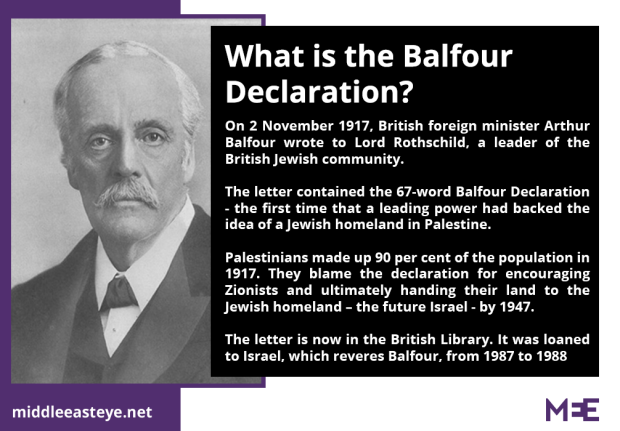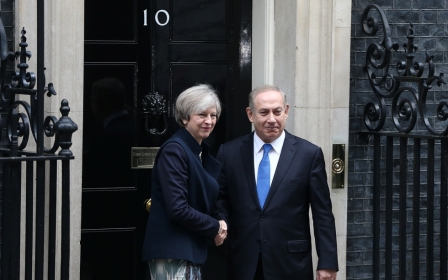The Balfour Declaration: Enduring colonial criminality

Over the past two weeks, much has been written and said to mark 100 years since the Balfour Declaration was issued.
Although it is hard to imagine a more duplicitous, illegal and immoral document to accurately reflect the enduring perfidy of British colonial malfeasance, the New York Times and Washington post headlines described it as "divisive" and "divides", as if their respective reporters wrote those articles together over too many drinks the night before.
The Los Angeles Times was equally mealy-mouthed, writing that the document "still haunts the Middle East". Theresa May attended a centennial celebration alongside Benjamin Netanyahu, while Jeremy Corbyn honourably refused to partake in the ignominy.
The Balfour Declaration doesn't "haunt" us. It teaches us that Western powers cannot ever be trusted
Boris Johnson babbled his usual mindless drivel. Street artist Banksy held an apology party for Palestinians in Bethlehem.
Palestinians marched the cramped streets of our shrinking cities, burning effigies of Theresa May in protest, and the rest of us, whose lives were shattered beginning with that piece of paper, remained as resolute and traumatised on this day as other days of decades past in the terrible fates of refugee camps, exile, and prisons of various sorts.
Drafted by Zionists, not Balfour (1917)
The declaration was a 67-word letter between two powerful British men to take away Arab lands from her native people and give it to Jewish European citizenry. On 2 November 1917, Lord Balfour "on behalf of His Majesty's Government" promised Lord Rothschild, a private British citizen and the patriarch of the powerful Jewish European banking family, that Britain would support "the establishment in Palestine of a national home for the Jewish people."
That sentence alone not only promised to give away another people's country (Palestine) – at the time ruled by yet another nation (Ottoman Empire) – but it also formalised the ahistorical concept of "the Jewish people", as if citizens of disparate cultures, nationalities, languages and locations constituted a singular race or ethnicity by virtue of their shared religion.
Although the letter is addressed from Balfour to Rothschild, it was first sent from Rothschild to Balfour on 18 July 1917, following debate among Zionists to draft the precise formula for the letter.
An adjustment was made by Balfour to note that "it being clearly understood that nothing shall be done which may prejudice the civil and religious rights of existing non-Jewish communities in Palestine," before returning it as an official state correspondence to Rothschild.
Thus, it was a tiny group of elite European Jews who dictated British foreign policy in the dark, in contravention of formal treaties between allied world leaders, and also against British public opinion. One cannot therefore examine this letter in isolation from this larger context of overlapping agreements, treaties, studies and commissions, all of which stood in stark opposition to it.
McMahon-Hussein Agreement (1915)
Two years prior, on 25 October 1915, Sir Henry McMahon struck a quid pro quo agreement with the Sharif of Mecca, later King Hussein, that Great Britain would recognise Arab independence after World War I "in the limits and boundaries proposed by the Sherif of Mecca" (which very clearly included Palestine) in exchange for Arab resistance against the Ottoman Turks.
Three years after the Balfour Declaration, the struggling Ottoman Turks tried to persuade King Hussein to ally with them against the British, similarly promising Arab independence.
Being a man of honour, King Hussein disclosed the overture to Britain, and Lord Balfour replied with a clear affirmation of the McMahon-Hussein terms that: "His Britannic Majesty's Government with the Allied Powers confirms its previous pledges respecting the recognition of independence of the Arab countries."
General Allenby, head of the Allied forces in Egypt and Palestine, repeated these assurances on multiple occasions, including in a letter addressed to His Majesty the King of Hijaz, dated 8 February 1918, and in a declaration at the gates of Jerusalem in December 1917. So did Lord Curzon, minister of foreign affairs, in an October 1919 letter to King Faisal.
In fact, there were many such utterances and affirmations of these terms, and there was no doubt in the official public agreements between world leaders that "all nations speaking the Arabic language should be freed from Turkish rule, and should thereafter live under that government which they choose."
Sykes-Picot Accord (1916)
The Balfour Declaration was made without consultation with the native Arab inhabitants of Palestine. There was yet another secret duplicity, conducted in 1916 between Britain and France to divide Arab lands into spheres of influence, which was unexpectedly uncovered by the Bolshevik revolution.
According to British historian Richard Coke, the Sykes-Picot agreement was "difficult to reconcile with either the Twelfth Point (to which they both [Britain and France] solemnly subscribed in the treaties of peace), their own join declaration of November 1918, or the conditions of Article 22 of the Covenant [of the League of Nations], to which, again, they both subscribed in accepting the Mandates [over Arab lands]."
80.4 percent of the population voted for a united democratic Arab nation that included present-day Palestine (the whole of it), Lebanon, Syria, Jordan and Iraq.
In fact, it was Zionist opposition that prevented the full implementation of the Sykes-Picot Agreement, which set forth to split up Palestine and internationalise Jerusalem, and led them to push for a supplement that became the Balfour Declaration.
Anglo-French Declaration (1918)
Based on public agreements and assurances from the British, the peoples of Palestine, Syria, and Mesopotamia rose up heroically to join the Allied powers against the Turks.
As the Ottoman Empire crumbled, England and France issued a joint statement declaring that their aims in liberated Arab lands were "the establishment of governments and administrations deriving their authority from the initiative and the free choice of the native populations… Far from seeking to force upon the populations of these countries any particular institutions, France and Great Britain have no other concern than to ensure…the normal working of the governments and institutions which the populations shall have freely adopted.”
King-Crane Commission (1919)
The will of the native populations referenced in the Anglo-French Declaration were clearly shown in the King-Crane Commission, an American envoy dispatched by Woodrow Wilson in June 1919 to the region for the purpose of investigating the wishes of the native inhabitants.
The commission reported that 80.4 percent of the population voted for a united democratic Arab nation that included present-day Palestine (the whole of it), Lebanon, Syria, Jordan and Iraq.
The report emphatically opposed the establishment of a Jewish state in Palestine because "Zionists looked forward to a practically complete dispossession of the present non-Jewish inhabitants of Palestine."
The report also used wording from the Balfour Declaration to point out that "a Jewish State [cannot] be accomplished without the gravest trespass upon the civil and religious rights of existing non-Jewish communities in Palestine."
The Mandate
On 29 September 1923, following the defeat of the Ottoman Empire, a victory that could not have been achieved without the resistance and sacrifices of the Arabs, Great Britain and France officially assumed mandates for Palestine and Syria, respectively.
Yet, unforgivably, the mandate included provisions for the establishment of a Jewish national home. The criminality of this provision was underscored over the following years by Britain’s iron fist against the native Palestinian inhabitants, which menaced their very existence in order to facilitate Jewish immigration.
Multiple commissions and studies were dispatched to assess the situation in British Mandate Palestine, with all of them rebuking the administration's actions toward Palestinians, who had begun to rise up against the mounting injustice they faced.
I could not find a single mainstream western media dispatch that articulated the depth of this historic criminal betrayal of Arab peoples by Europe and the United States
Calling this "a bad political mistake", Richard Coke said: "Unfortunately, the bill in this case will not be paid by the framers of the Balfour Declaration and their Jewish friends in high quarters in London and New York, but by the unfortunate inhabitants of Palestine and, in emergency by the ordinary Tommy and the ordinary British tax-payer."
Yet against this ongoing criticism of the mandate's policies; against its own agreement with Hussein, the leader of a nation allied with Britain; against the wishes of 3.2 million native Arab inhabitants who voted in the King-Cane Commission; against the articles of the League of Nations; against President Woodrow Wilson's 14 points for world peace, which were accepted by Great Britain; against the Anglo-French Declaration; against the Sykes-Picot Agreement; against vigorous public and parliamentary opposition to the Balfour Declaration; and against aspects of the Balfour Declaration itself, Britain actively facilitated the initial phases of what would become the utter dislocation of an entire ancient civilization and reconstitution of their land with an imported society, per Zionist aspirations.
The question then is why was this illegal promise implemented against such a backdrop?
The US, oil, money, and anti-Semitism
In the same way that powerful Zionists personalities today conduct dark deals to shore up official support in contravention of international law, UN resolutions, and international public opinion, so they did a century ago.
Several personalities stand out, including Chaim Weizmann, Nahum Sokolow, Louis Brandeis and Samuel Untermyer. These men collaborated across continents in the halls of power to influence policies and place Zionists in important posts, particularly in France, England and the United States.
Weizmann recruited the Rothchilds, used his charm, the promise of Jewish war-time loans, and prevailing anti-Semitic beliefs in Jewish power to seduce European statesmen to the Zionist cause.
Russian Jewish Zionist leader Ze'ev Jabotinsky once claimed that "the declaration is the personal achievement of one man alone: Dr Chaim Weizmann. Four years of patient and calculated work established the link between us and each one of the statesmen in this country [Great Britain]." The British intelligencia was aware of him, too.
Undoubtedly, Europe and the USA looked upon Israel (as they do now) as a kind of western oasis wherein to exert control over a sea of dark and backward peoples who possess a great natural resource
In 1922, the Daily Express asked: "Who is this Mysterious Chaim, who has inveigled the innocent and unsuspecting British into the mire of the Middle East."
Sokolow was likewise instrumental in securing support from the Italians and French. But perhaps the most important of them was Louis Brandeis, who had the ear of President Woodrow Wilson, and whose support is perhaps what ultimately persuaded European powers to back the Zionist project.
Great Britain understood that winning the war depended on the United States joining the war.
But Woodrow Wilson had won the presidential election by running on a campaign as the anti-war candidate (his slogan was "He Kept Us Out Of The War").
But Zionists signalled to European powers their ability to persuade President Wilson to join the war in exchange for the British giving them Palestine, over which it had neither sovereignty nor legal title.
Their ability to effectuate such influence came from Louis Brandeis, who had been appointed to the Supreme Court by Wilson and was one of the early drafters of the Balfour Declaration.
Indeed, Brandeis successfully exerted pressure on Wilson to adopt the Balfour Declaration (which Wilson initially rejected) and to commit the United States to war.
No doubt this reinforced anti-Semitic perceptions of Jewish power and it has been argued that the Allied powers feared that Zionists might solicit similar offers from the Central Powers to tip the war outcome differently.
Of course, there is also the oil argument, which may have played a part, particularly in the later years when oil was discovered in the region. Undoubtedly, Europe and the USA looked upon Israel (as they do now) as a kind of western oasis wherein to exert control over a sea of dark and backward peoples who possess a great natural resource.
Not "Divisive". It Does Not "Haunt" Us.
Palestinian and other Arab intellectuals at the time observed that the Balfour Declaration intensified pan-Arab nationalism and spread it among the masses.
Professor Barry Rubin writes: "The dream of a united Arab state was no mere abstraction. Arab nationalists in the Fertile Crescent did not need to strain their memories to recall the area's centuries-long unity under the Ottomans…With this cosmopolitan background, they had little stake in any particular portion of the domain; possessing the common language, culture and worldview of the Arab world, all boundaries within it seemed artificial to them."
The Balfour Declaration doesn't "haunt" us. It teaches us that Western powers cannot ever be trusted; that far from being representative democracies, they are ruled by an elite minority driven by self-interest, not by the will or interest of their people, nor the integrity of their agreements; and that these societies are lulled into complacency by propaganda promulgated through a supposed "free press".
I could not find a single mainstream western media dispatch that articulated the depth of this historic criminal betrayal of Arab peoples by Europe and the United States, nor did I find a sufficient audit of the political machinations that effectively invented the Jewish state.
But we Palestinian know what really went down. We know that this November is also the centennial of another fateful moment, when the masses of people stormed the palaces of elites such as Balfour and Rothschild, killed them all, and set out to create more equitable society based on "Peace, Bread, and Land". We know that anything can happen.
- Susan Abulhawa is a Palestinian-American writer and bestselling author. The Blue Between Sky and Water (Bloomsbury, 2015) is her most recent novel.
The views expressed in this article belong to the author and do not necessarily reflect the editorial policy of Middle East Eye.
Photo: Israeli security forces fire tear-gas to disperse Palestinians after clashes broke out inside Al-Aqsa mosque's compound in Jerusalem's Old City on July 272017 (AFP)
New MEE newsletter: Jerusalem Dispatch
Sign up to get the latest insights and analysis on Israel-Palestine, alongside Turkey Unpacked and other MEE newsletters
Middle East Eye delivers independent and unrivalled coverage and analysis of the Middle East, North Africa and beyond. To learn more about republishing this content and the associated fees, please fill out this form. More about MEE can be found here.






